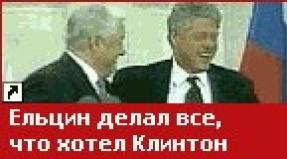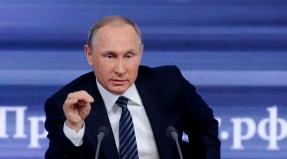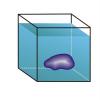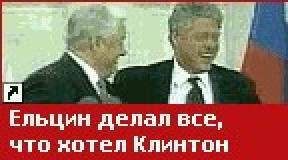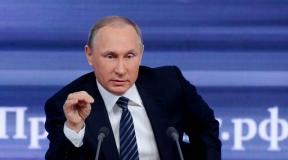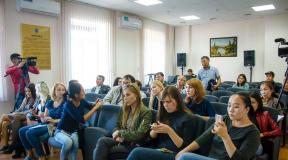Boris and Bill. Tanya, Valya and the chronicler of Russian history Talbott Talbott Strobe Bill and Boris
Red> Strobe Talbott, a former US deputy secretary of state, will become president in July.
This article is an abridged version of his book, The Russia Hand: A Memoir of Presidential Diplomacy, by Strobe Talbott, published this month.
Often the press conferences of the two presidents turned into what journalists called the “Boris Show.” And Bill Clinton had to make a lot of efforts to smooth over the antics of his colleague, Boris Yeltsin. Clinton, alone among his circle, had sufficient tolerance and a willingness to forgive. This was not just a good attitude towards Yeltsin as a person, it was partly support for the general direction in which Russia was moving.
On Monday, June 5, 2000, at noon, Bill Clinton and Russian President Vladimir Putin descended from the Tsar's Porch of the Grand Kremlin Palace. At this moment, which ended the official part of Clinton's fifth and final visit to Moscow as president, all the nuances were expressed in body language: the burly Clinton loomed over the second welterweight wrestler Putin - a master of communication, still not losing hope of establishing contact with the coldest from a customer who simply refuses to buy.
As they shook hands for the last time, I hurried down the steps to take my place on the jump seat in the back of the armored Cadillac flown in from Washington for the summit.
As soon as Clinton took his seat, he looked back at Putin through the thick bulletproof glass, smiled his widest smile and waved goodbye to him. We then headed towards the western outskirts of Moscow, where retired former Russian President Boris Yeltsin lives today.
When we arrived, Yeltsin was already meeting us at the front entrance
PHis wife, Naina, stood on one hand, and on the other, his youngest daughter, Tatyana Dyachenko. As the car slowed to a stop, Clinton noticed that Yeltsin's face was puffy, sallow in color, and he seemed dazed and unable to stand on his own.
During the eight years that they knew each other, Clinton and Yeltsin often joked about the fact that they were both 6 feet 2 inches (about 188 cm) tall: it was easier for them to look into each other's eyes. Now, as the limousine pulled up to the stop, Clinton, scrutinizing the greeting Yeltsin through the window, noticed that since the last time they had met seven months earlier, when Yeltsin was still president, Yeltsin seemed to have become 1- 2 inches (2.54 - 5.08 cm) shorter.
After Clinton got out of the car, he and Yeltsin silently embraced and stood there for a full minute. Yeltsin repeated in a low, choked voice, “My friend, my friend.” Then, taking Clinton's hand, he led him through the foyer into the living room, which was flooded with sunlight through a Venetian window overlooking the manicured lawn and a group of birch trees in the yard. They sat in gilded oval-backed chairs next to the sky-blue tiled stove while Naina bustled about, serving them tea and huge slices of the richly creamed, layered cake that she proudly noted she had spent half the night baking.
Clinton prepared for what he thought would be a relaxed exchange of memories and pleasantries, but Yeltsin was determined to take care of business first. Immediately turning stern, he announced that he had just gotten off the phone with Putin, who wanted him to emphasize that Russia will pursue its interests as it sees fit: it will resist pressure to acquiesce to any American policy that represents threat to Russian security. Clinton, having listened enough to Putin for three days, who politely rejected the American plan to build an anti-missile system, was now subjected to unceremonious pressure.
Yeltsin’s face was stern, his figure tense, both palms clenched into fists, each of his phrases sounded like a proclamation. He seemed to relish the assignment Putin gave him. It gave him the opportunity to show that he was not a frail pensioner, but a man still connected to the power of the Kremlin, still an active spokesman for Russian interests and still capable of standing up to the United States when it tries to dictate to the rest of the world.
Clinton listened patiently, even good-naturedly, to the intimidation
He saw Yeltsin in all his guises: a growling bear and a papa bear, a bully and a sentimental person, a stubborn person who spoiled everything, and a person with whom one could negotiate. He knew from experience that meetings with Yeltsin almost inevitably involved an exchange of barbs before the two of them could get down to real business.
When Yeltsin finally calmed down, Clinton gently took control of the situation. He also had one thing to do. He's not sure, he said, how accurately "this new guy of yours" defines both his own strength and the strength of his country. Putin seems capable of leading Russia in the right direction, but does he have the qualities, instincts and beliefs that will allow him to realize this ability?
Why, Clinton wondered aloud, is Putin so ready to negotiate with the communists, “these people whom you, Boris, fought so hard and overthrew?” Why is Putin clamping down on freedom of the press, “which, as you know, Boris, is the lifeblood of an open and modern society?” Yeltsin nodded his head solemnly, but did not answer. All pugnacity, swagger and confidence left him.
“Boris,” Clinton continued, “you take democracy to heart. Trust in people is in your nature. You have inside you the fire of a real democrat and a real reformer. I’m not sure Putin has all this. Perhaps he has these qualities possesses. I don’t know. You need to keep an eye on him and use your influence so that he doesn’t go astray.
Putin needs you. Whether he knows it or not, he really needs you, Boris. Russia needs you. You really changed this country, Boris. Not every leader can say this about the country he led. You changed Russia. Russia was lucky to have you. The world is lucky that you held the position that you did. I was lucky to have you. The two of us have done a lot together, you and me. We have gone through difficult times. We never let things fall apart. We've done a lot of good things. All this will live. It required willpower on your part. Much of this was harder for you than it was for me. I know that." Yeltsin now held Clinton's hand tightly, leaning toward him. "Thank you, Bill," he said. - I understand".
 We were late. Then there was a quick group photo on the veranda, hasty goodbyes and another bear hug. "Bill," Boris said, "I really understand what you said. I'll think about it." “I know you will, Boris,” Clinton replied, “because I know what you have here.” Clinton patted Yeltsin lightly on the chest, right where his aching heart was.
We were late. Then there was a quick group photo on the veranda, hasty goodbyes and another bear hug. "Bill," Boris said, "I really understand what you said. I'll think about it." “I know you will, Boris,” Clinton replied, “because I know what you have here.” Clinton patted Yeltsin lightly on the chest, right where his aching heart was.
Once back in the car, Clinton remained focused for several minutes. He looked through the window at the birch trees shining brightly in the sunlight along the alley that led to the highway. “I may have seen Boris for the last time,” he finally said. “I think we will miss him.”
This is not how it all started in 1993
The Soviet Union was dissolved, thanks in large part to Yeltsin, and Russians entered a period of turbulent transition from totalitarianism to democracy, from a multinational empire to a nation-state, from a state-controlled economy to a market economy. The communist-led parliament, which was determined to impeach Yeltsin, met his every move with hostility. It was in this atmosphere that Presidents Clinton and Yeltsin first met.
There was, however, one issue where Yeltsin said he needed as much help as possible and as quickly as possible, and this concerned an emergency fund for the construction of housing for Russian army officers, whom Yeltsin promised to withdraw from the territory of the Baltic states in 1994. In our own program, we allocated $6 million for this. When Clinton mentioned this figure, Yeltsin said that he needed much more, adding that he could only make this request in private because he was embarrassed to talk about the appalling conditions in which which the once self-respecting Russian army lives.
Yeltsin continued his offensive - lunging, feinting and even trying to take Clinton at his word so that he would agree to public statements that could be interpreted as American concessions.
But that didn't seem to bother Clinton at all.
When the time came to thank Yeltsin for the first good acquaintance, he seemed to do it with all his heart. He instructed communications director George Stephanopoulos to tell the press that he found Yeltsin “full of energy, a real fighter,” after which he added, no longer for the press, the following: “At gunpoint, I do everything I can.” He's capable and this guy is no different. He's not deterred by the odds against him and he's in the best shape he can be right now."
There was hardly room for such a statement when both delegations joined the presidents this evening for a boat tour of Vancouver Harbour. Before we had time to leave the pier, Yeltsin had already knocked back three shots of Scotch whiskey. At dinner that night he drank four glasses of wine and ate almost nothing. Secretary of State Warren Christopher gave Stephanopoulos a note: "Not eating, that's a bad sign. Got pumped up during a boat trip." Subsequently, monitoring how much Yeltsin accepted became standard practice at all summits.
Yeltsin's speech became more and more sentimental, and his statements became mawkish ("B-i-ll, we are not rivals - we are friends!"). His assistants watched him with increasing nervousness. They tried to drive away waiters with alcoholic drinks, only for the president to cancel their orders. Our own president was unperturbed. It seemed that he liked Yeltsin's antics.
That evening, back at the hotel's Presidential Suite, Secretary of State Christopher, National Security Adviser Tony Lake, and I sadly contemplated the prospect of conducting high-stakes diplomacy under the conditions we had witnessed throughout the day. . Clinton told us not to worry. “I had the opportunity to observe this problem a little in my time,” he said, referring to personal experience with his adopted father, who was an alcoholic. “At least, Yeltsin is not a hopeless drunk ".
Russia's economic condition and its fraught transition to a market economy were not the only topics on the Clinton-Yeltsin agenda. The West's desire to expand the North Atlantic Treaty Organization (NATO) to include former Soviet bloc countries quickly became one of the most intractable issues that continually strained relations between the two presidents.
When Yeltsin flew to Washington in September 1994, Clinton was determined to show him that NATO expansion did not necessarily threaten Russia and would be evidence that the Cold War was indeed over. When Yeltsin stepped off the plane at Andrews Air Force Base and stepped onto the jetway, he held the railing with his hands and concentrated before each next step. His entourage tried their best to shield him from film and photojournalists who recorded his descent down the ramp. On the last step he slipped and was forced to grab his wife's hand.
That evening at the Blair House Hotel, Yeltsin was very drunk, staggering from room to room in his underpants.
Once he went down the stairs and began to pester the Secret Service agent, who managed to persuade him to go back up and return to his own bodyguards. Soon Yeltsin reappeared on the stairs, loudly shouting “Pizza, pizza!” Finally, his bodyguards grabbed him by the arms and quickly led him away, trying to calm him down.
The next day, at the first official meeting at the White House, with the two delegations sitting across the table from each other, Yeltsin was more sober but overly excited. He rattled off a long list of under- or over-ripe suggestions. “Come on, Bill, agree!” he repeated every now and then, without waiting for an answer, which was for the best, since the answer was always the same: “Our people will discuss this, Boris.”
Only when the two presidents met face to face did Yeltsin give up the posturing, and then Clinton could continue to work on it. That chance came on September 27, during an informal breakfast in the family dining room in the East Wing. Clinton asked me to attend this breakfast, in part because I could listen to Yeltsin's answers twice, first in Russian and then translated into English. We expected Yeltsin to raise the topic of the future of NATO, but he did not. While breakfast was going on, the two presidents discussed, as it seemed to me, every issue on earth, excluding the future of NATO. I was beginning to wonder if Clinton also wanted to avoid this topic.
Finally, when the coffee arrived, Clinton put his hand on Yeltsin's arm, leaned towards him and said: "Boris, on the NATO issue, I want to be sure that you notice that I never said that we should not consider Russia's membership in this organization or its special relationship with NATO. And therefore, when we talk about NATO enlargement, we emphasize inclusion, not exclusion. My goal is to work with you and with others to maximize the chances of a truly united, indivisible, integrated Europe.
NATO will expand, but the timing of the expansion has not yet been announced. If we start accepting countries tomorrow that want to become NATO members, it will still be several years before they are ready for this, and others will confirm this and agree to accept them. The issue comes down to the psychological safety and sense of significance of these countries. They fear that they will be left in a "gray area", or purgatory. And so we are going to take a step towards resolving this problem. But I will never do anything behind your back. I want you and I to work closely together and get through this together."
Yeltsin listened attentively. “I understand,” he said when Clinton finished his speech. “Thank you for everything you said. If you were asked about this at a press conference, I would suggest that you say that the United States is in favor of NATO expansion, that the process will be long-term and gradual. If you are asked whether you exclude Russia from joining NATO, you should answer “no.”
Clinton promised that US policy would be guided by the "three nos": no to surprise, no to haste and no to exception.
That evening, Yeltsin and Clinton gave a joint press conference in the East Room of the White House. Yeltsin was in a state of what US Deputy Secretary of State Sandy Berger described as "high nonsense": - he joked, shook his fist in the air, played to the audience, spoke a thousand words a minute, listing all the good things he was going to do together he and his friend Bill.
US State Department translator Peter Afanasenko not only translated, but also depicted the essence of the dialogue with great skill. Clinton was laughing his ass off. He wanted the audience to take it all in a fun spirit. Several colleagues who knew about Yeltsin's first stormy night at Blair House cast questioning glances at me. I knew what they suspected. I shook my head slightly: I was monitoring how much Yeltsin drank at lunch, and this dose was clearly not enough to explain his manic talkativeness.
A pattern began to emerge in the way Yeltsin conducted these meetings: in plenary sessions, with many people sitting on both sides of the negotiating table, he played the role of a decisive, even uncontroversial leader who knows what he wants and insists that get it; in the course of private conversations, he became attentive and receptive from assertively self-confident, yielding to Clinton’s seduction and persuasion; then, at the final press conference, he went out of his way to project self-confidence in ways of his own making and mask how malleable he was behind closed doors.
In October 1995, Yeltsin flew to New York to speak at the United Nations (UN) General Assembly. There he gave a fiery speech in which he flayed NATO for bombing Serb targets in Bosnia and warned that NATO expansion would mean "a new era of confrontation."
Yeltsin and Clinton were to meet at Roosevelt's former estate in Hyde Park, New York, for what promised to be intense and important talks on a range of contentious foreign policy issues. After discussing Bosnia, the two presidents turned their attention to the Treaty on Conventional Armed Forces in Europe. Yeltsin was clearly striving for success. During a private conversation, he was more than willing to delve into the details of this agreement, which have been slowing down the work of our negotiators for many months.
Yeltsin did come to Hyde Park to seal the deal, but not in the presence of his subordinates. He sent his foreign policy adviser to retrieve a map concerning the dispute over conventional forces in Europe. As the aide obediently walked toward the door, Clinton caught Yeltsin's hand. “Listen, Boris,” he said, “it’s not about the details, it’s about the main idea. That’s what you and I should be concerned about. You and I, we shouldn’t be weeding in this matter.”
Yeltsin frowned and looked uncertainly at the door through which his assistant for foreign affairs, Dmitry Rurikov, had just exited. Clinton leaned even closer to him and squeezed his wrist. "Boris, look at me! You understand what I'm saying. Don't pay attention to your man. This is just between the two of us. I think that before the card you should take some pressure off, and I tried to make sure you got that opportunity . But we need to do this quickly. We don't need to continue to bargain further. “Yes,” Yeltsin said, suddenly falling away. “Okay.”
The waiter appeared with glasses of dessert wine poured
Yeltsin, who had already sipped a good half of a bottle of Russian River at lunch, tasted the wine, found it too sweet and asked for cognac. Clinton, as a host, felt he had to accommodate his guest's wishes. It therefore fell to me to see that brandy was on hand.
I didn't try very hard. I returned empty-handed just as Yeltsin’s assistant was hurrying back into the room with a load of papers, including, I’m sure, some kind of Russian counterproposal. However, by that time the conversation between the two leaders had already moved on to other topics.
Yeltsin wanted to talk a little with the press about his open relationship with Clinton. He repeated his original call for closer and more frequent contacts, in a new burst of drunken zeal: “Bill, I want to say that our cooperation continues to be strong and reliable. Even on complex issues like Bosnia I, we can find a solution. Our cooperation means a lot to us. Not only do we need it, the whole world needs it. We may leave the stage, but what we have achieved will remain as our legacy. This is the main thing we should strive for in communicating with each other. It's you and me, Bill and Boris."
As they stood up to meet the press, Clinton gave Yeltsin a pair of handmade cowboy boots that were supposed to fit him better than the pair given by George H. W. Bush at Camp David in February 1992
Clinton asked Yeltsin to remove one of the shoes so they could compare sizes. They exchanged their right boots, which fit very well, allowing Clinton to remark, as he always did, how similar their builds were. This fact, apparently, always pleased Yeltsin. Yeltsin said that maybe they should go to the press conference in each other's shoes, but his head of protocol, Vladimir Shevchenko, on the verge of panic, convinced Yeltsin not to do so. “Boris Nikolaevich,” he whispered, “the press will present this fact in an unsightly way.”
During the press conference, Yeltsin gave the journalists exactly the “Boris Show” they were hoping for. He ridiculed the media for predicting that the United States and Russia's differences over Bosnia would turn the summit into a disaster. Pointing his finger directly at the camera, Yeltsin growled: “Now, for the first time, I can tell you that the catastrophe is you!”
Yeltsin's diplomacy was always a kind of performance, and when he was drunk, the performance turned into burlesque: it was one of the worst incidents that had happened so far. Clinton, however, burst into laughter, clapped Yeltsin on the back and began wiping tears from his eyes. “Just make sure you understand everything correctly,” he said, walking up to the microphone and continuing to laugh - a little forced and unconvincing.
I felt that Clinton was trying to cover for Yeltsin. Perhaps he figured that if both presidents were fooling around, news reports would pay less attention to Yeltsin's drunkenness.
Whatever Clinton's motives, the whole scene sent shock waves through the American president's entourage.
Going back to the first Vancouver summit, Clinton's leniency toward Yeltsin sometimes horrified those of us on the president's team. What we thought was terrible about Yeltsin's behavior, Clinton found funny.
Shortly thereafter, as I sat next to the president on a helicopter heading back to New York, Clinton, still chuckling, asked, "That was a show, wasn't it?" I suspect he wanted to be praised for the way he handled a dangerous situation.
I couldn't bring myself to applaud him, but I didn't dare criticize him either. So I just said, "Well, what you two had was very positive and helpful. You were really able to talk things through with him. I hope the press conference doesn't hurt him in any way."
Clinton listened to this and then looked at me intently. Then he said: “You know, we have to remember that Yeltsin has problems, but he is a good person. He is doing everything he can, trying to solve the huge number of problems that he has at home. I think that we will solve this issue with Bosnia to her, and for him all this is more difficult than for me. I have problems, but of a completely different kind. We must never forget that a drunk Yeltsin is better than most of the non-drinking alternative candidates." I had heard similar statements before, but this time they were reproachful.
Clinton believed that not only was I being too harsh towards Yeltsin, he believed that I should soften my attitude towards him as well
I began to understand something about my boss and his seemingly limitless ability to tolerate or laugh at Yeltsin's antics. Partly this was not only due to Yeltsin personally - partly it was our support for the general direction in which Russia was moving. The whole country, like Yeltsin, was in chaos.
However, Clinton's condescending attitude toward Yeltsin's behavior appears to have had deeper roots. The main thing, as I imagined it, could be that Yeltsin combined amazing determination and fortitude, together with an absurd indiscipline and some kind of talent for self-abasement.
He was both a very great man, and a very bad guy, and a born leader, and an incurable tyrant. Clinton understood all this, finding it easy to forgive Yeltsin and wanting others to forgive him too.
Translation: Viktor Fedotov, inoSMI.Ru
Published on the website inosmi.ru: May 27, 2002, 20:28
Original publication: Boris and Bill
© National information service Strana.Ru, 2000. Certificate of registration with the Ministry of Press of the Russian Federation: El. #77-4102 dated September 7, 2000. When using materials in full or in part, a link to inoSMI.Ru is required.
"BILL AND BORIS. Notes on presidential diplomacy." This is the name of the book that appeared on book shelves by the former Deputy Secretary of State of the United States S. Talbott. The author, a close friend of former US President Bill Clinton, who oversaw the Russian direction at the State Department, knows better than anyone the real mechanism of relations between the American and Russian leadership. The book is strictly documentary and written, as they say, by a 100% American, convinced to the core of the superiority of the United States over the rest of the world. Talbott does not consider it necessary to soften the language concerning Yeltsin, Chernomyrdin, Putin and other Russian politicians - the weak and dependent should listen to the strong, and not vice versa. As for their possible protests and grievances, let them get used to keeping quiet and not objecting. The birds are small. It’s cynical, but the bitter truth is better than the sweet diplomatic lie.
WHEN READING THE BOOK, you experience a painful feeling of shame. Let the traditions of “Soviet totalitarianism” still dominate us, ordinary Russians, from the position of an American diplomat. But we, especially those who were brought up and lived in Soviet times, have retained respect and love for their country. It’s painful and offensive to read what was written by a well-informed American about our recent and current leaders, especially about how they came to power or tried to maintain it... Here, for example, is how Talbott lifts the curtain on the appointment of V. Putin as successor Yeltsin:
“The ax fell on the neck of Stepashin (then head of the Russian government - V.L.). On August 9, Yeltsin announced that he was nominating Vladimir Putin for the post of Prime Minister - already the fifth prime minister in the last year and a half. Tatyana (Yeltsin’s daughter. - V.L.) and Valentin Yumashev (a journalist close to Yeltsin, who later married his daughter - V.L.) convinced Yeltsin that the combination of Putin’s management skills and personal loyalty made him the most reliable successor.
“He won’t give us up,” said Tatyana (they believed that Putin would protect Yeltsin and his family from legal actions caused by unfounded accusations of corruption. Some die-hard Duma members still wanted to try Yeltsin for dismantling the USSR and turning Russia into almost a lackey West)".
The daughter of a sick, drunkard (Talbott also writes about this quite frankly) president, together with her unremarkable lover, puts at the helm of the country a man who, due to “personal devotion” and “managerial skills,” must save the family from the inevitable trial for the gravest crimes of state and corruption. Talbott, however, considers the accusations of corruption against the presidential family to be “unfounded.” But unlike him, we live in real Russian life and we know what scale this evil acquired precisely during the years of Yeltsin’s rule. And the fish, as everyone knows, rots from the head.
However, Talbott refrains from commenting on who and how organized Putin’s nomination to the main post. With “civilized” democracy, in which the memoirist-diplomat so sacredly believes, here, in his opinion, everything is in order. But let’s try to imagine a similar situation in the USA. Let's assume that President Bush, whose rating, by the way, is rapidly falling (as Yeltsin did in his time), is making an attempt, with the help of his loved ones, to protect the interests of his family. Bush's daughter, together with her lover, "nominates" a mediocre person who has not proven himself in any way, but is loyal to the Bush clan, as the future president. And Bush Jr. resigns early to clear the way for his clan’s protege to the White House. So, the question arises, is such a situation possible in the USA or any other civilized Western country? Yes, for one such assumption, not to mention specific actions, any politician will be ground into powder, forever excommunicated from the “democratic” system. And a zealous champion of “civilized” values, Talbott considers the actions of the Yeltsin clan to be completely “democratic.” Now, if they nominated a “nominee” that the United States did not like, then the whole world would immediately hear a noise... And for many years.
Tanya and Valya were not mistaken about Putin. No one laid a finger on the Yeltsin family under him, and never will. Who would dare if she has more real power than the current president. With all his “management skills”, it is unclear what they consist of. The country, despite the favorable economic situation, is actually marking time. There were no real cases either under Yeltsin or under Putin. Just empty promises and ostentatious, purely PR exhortations by the president to his ministers in the news blocks of leading TV channels. We need to work “even better”, “even more”, “even more responsibly”, “pay special attention” and the like, which in the run-up to and during the ongoing election campaigns they are seriously trying to pass off as “innovative” government activity. Only very limited and downtrodden people are able to believe the usual official lies about some unprecedented “successes”. We heard a lot about these “successes” back in Yeltsin’s time. Then, however, there was less cheerful chatter, and the “no alternative” Yeltsin appeared on television much less often, remembering, apparently, from Gorbachev’s experience, how dangerous it is to irritate people with endless and empty talk.
However, do the current leaders of the country and those who stand behind them care about people? The hopeless life of most of them, especially in the provinces, is getting worse and worse. But Tanya and Valya, who have already become husband and wife, still feel very comfortable. Their still powerful father and father in law too. Having stopped drinking glasses of “bitter” (there are a number of bright passages about this in Talbott’s book) and therefore looking ten years younger, he not only enjoys a well-deserved honorable rest, but also joins, sometimes quite unsuccessfully, in the leadership of the country. In short, the family is happy with their choice. And this is the main thing in the end.
Judging by S. Talbott's book, Tanya and Valya's contribution to the new things that now determine the life of our country is not limited to the selection of personnel that suits the family. Israeli Prime Minister Barak, writes an American diplomat, after his visit to Moscow and meeting with President Yeltsin, “called Clinton and told about his impressions. Yeltsin, he believed, was “focused, energetic and radiated energy.” But Barak later learned: The meeting so undermined the Russian president's strength that after it emergency intervention by doctors was required. Barak said that Stepashin also impressed him, but he was informed that a new prime minister would be appointed in a few days.
“They told me the name of the successor,” he said. - Some kind of Putin."
Interesting episode, isn't it? Thanks to the efforts of Russian politician-memoirists, including Yeltsin himself, efforts that were helped in every possible way by the “independent” Russian media, a stereotype has emerged about the “suddenness” of the former president’s personnel decisions. I remember the complete confusion and stupefaction of S. Stepashin, the then Russian Prime Minister, when at a government meeting Yeltsin announced his decision to resign. For the second person in the Russian state, this decision was truly sudden; there is no need to talk about others. But the Israeli Prime Minister and the US President were informed about this several days in advance! I wonder how they could have found out what was essentially a top state secret and was known only in a narrow presidential family circle?
Talbott's book gives another example of this kind. The American Embassy in Moscow, he writes, learned about Yeltsin’s upcoming resignation much earlier than others. Ambassador Collins, who was on friendly terms with Talbott, “was so convinced of what he heard that he called me in Washington, where it was not yet dawn.” “You better wake up,” he said in a casual, hoarse voice. “It looks like Boris Nikolaevich is going to work for the last time today.” He soon called back and advised us to turn on the TV.”
It is hardly worth believing that such amazing awareness is caused only by the good work of the embassy or intelligence officers. It is precisely from Yeltsin’s times that a most dangerous tradition has arisen, when foreigners close to the Russian political elite are the first to learn about upcoming decisions that are most important for the country.
Talbott, however, does not notice, or rather pretends not to notice, an obvious anomaly here that is unacceptable in any self-respecting state. For the arrogant Yankee, we Russians are inferior, flawed people who have to grow and grow to become truly civilized. Nowhere, however, does the American diplomat directly talk about this; he simply proceeds from such a premise, apparently reinforced by many years of communication with representatives of the current Russian elite, which is fawning and humiliating itself before the West. However, Mr. Talbott managed to find one full-fledged Russian, who had truly assimilated Western values and ideals, in barbaric Russia. And who was it, do you think? Of course, Alexander Yakovlev, a former member of the Politburo and one of Gorbachev's close associates.
“You shouldn’t worry too much about Zhirinovsky,” he shared his secrets with Talbolt, “he’s basically crazy, the Russians “won’t even follow him to the toilet.” You need to worry about the communists: they, not the fascists, turned the last century of history Russia is in such misery. This is the danger we should pay attention to... The communists, as before, prefer violence and are ready to do anything to maintain power... You must support the reformers, and above all else they need time. what they are fighting against has taken deep roots in Russian soil, especially in my generation. Your entire strategy must give Russia time during which the country will bring my generation to the grave, where it belongs... And no matter what they say about Boris Yeltsin, he understands it deeply, right down to his guts.”
Talbott was so delighted with these words that he immediately rushed to please his friend, President Clinton, with them, “knowing that they would strengthen his views, as they strengthened mine.”
The views are indeed “humanistic” and “highly civilized” to the core. The generation that lived under socialism and Soviet power would die faster, or, as Yakovlev puts it with European elegance, “go to the grave where it belongs,” so as not to interfere with the “reforms” that are reviving capitalism in Russia. The youth, corrupted and fooled by the pro-bourgeois media, will no longer strive for social justice, free healthcare, education, high spirituality and real culture, or the restoration of Russia’s status as an independent and great power.
However, the Yeltsin regime, whose policies are continued by Putin, has long been actively implementing Yakovlev-Talbott guidelines not only in relation to the older generation, but also to the entire Russian people. Its extinction as the inevitable final result of all “reforms” is at the level of a million people a year. At this rate, by the end of the century there will be no more than 50 million of us left, and according to other sources, as many as 30. The country’s population continues to decline despite all the alarming words and promises of the current president to stop this terrible process. However, name at least one other promise that he fulfilled, brought, as they say, to a victorious end. There are no such people and they are unlikely to exist. Tanya and Valya selected him for something completely different.
Meanwhile, the president's ratings are still high. Indeed, Russia cannot be understood with the mind. Here, perhaps, we can agree with Talbott, who in his book more than once draws attention to the paradoxical and even absurdity of Russian political realities. This is probably why we live so poorly because we decide not with our minds, but with blind faith in the “good tsar”, “good secretary general”, “young, energetic president”. Even when it is clear that the secretary general or the president “can’t pull it off”, that the cap placed on them is “not up to the mark.” Perhaps they will “come to their senses” and “strength” for a second or third term. Yes, they won’t “pull” already if they didn’t “pull” the first time... How many times can you step on the same rake! And we keep advancing and advancing. And again we are preparing to attack the not-so-distant presidential elections. For the sake of the calm and luxurious life of Tanya, Valya and the handful of oligarchs and foreign “benefactors” of Russia standing behind them. And here we must give credit to Mr. Talbott - his book confirms this quite clearly and convincingly.
No less interesting, however, is the mechanism clearly outlined in the book of Washington's influence on decision-making by the Russian leadership - both Yeltsin's and the current Putin's. Well, more on that in the next article.
The US National Archives, in accordance with the law, declassified recordings of conversations between Boris Yeltsin and Bill Clinton, which the presidents conducted from 1996 to 1999. The recordings were made by the American side. According to the press secretary of the Russian President Dmitry Peskov, their publication was not coordinated with Moscow. These documents, totaling 591 pages, contain many previously unknown details, both private and politically significant.
Boris Yeltsin and Bill Clinton communicated for only seven years, but during this time they managed to meet 18 times and talk on the phone 56 times. Their conversations could form the basis of a gripping drama with elements of both farce and tragedy. These were the years of Russia's painful transition to a market economy and the search for a new identity. It was also not an easy time for America and the West in general. The Cold War was replaced by new threats: international terrorism, the collapse of Yugoslavia, the global economic crisis. Developments in Russia, weak but still militarily formidable, remained a matter of deep concern in Washington, and conversations between the two leaders fully reflected this concern.
October 23, 1995. Hyde Park, USA. Boris Yeltsin to journalists: “You predicted that our meeting today would fail. So this is not the first time I’ve told you that you failed!”
The dossier opens with a conversation during breakfast in the Kremlin on April 21, 1996. This was a critical moment for Boris Yeltsin: he was campaigning for re-election as president, this time of an independent Russia. His position was extremely difficult; his rating fell, according to some sources, to three percent. At the same time, the popularity of communist leader Gennady Zyuganov grew steadily.
Russia has been reforming for centuries, but has never brought the reforms to fruition
In his conversation with Clinton, Yeltsin did not hide the difficulties. Of the six registered candidates, according to him, only he and Zyuganov have a chance. The Russian President tells the US President that he is determined to win in the first round and asks him not to support Zyuganov. “You don’t have to worry about that,” Clinton replies. “We’ve been working for 50 years for a different result.”
“Zyuganov is pretending to be a social democrat,” Yeltsin enlightens him. “This will not work for him. He will end the reforms and abolish privatization. Of course, Russia cannot afford such a president. Russia has been reforming for centuries, but has never brought the reforms to fruition. Peter the Great, for example, Stolypin. Nobody succeeded.
I don't need power. But when I felt the threat of communism, I decided to run for office
Yeltsin complains about the American press, which believes that “there is no need to be afraid of communists, that they are good, worthy and kind people.” He opens Clinton's eyes: "Half of them are fanatics. They will destroy everything. That means there will be a civil war. They will erase the borders between the republics. They want to take back Crimea. They even lay claim to Alaska... I don't need power. But when I felt the threat of communism, I decided to run for office. We must prevent this."
Boris asks his friend Bill to help make Russia a full member of the Seven - according to his calculations, this will add 10 percent to his rating: “You know, Bill, you play a role in this campaign. It may not be very well known, but psychologically it is very important ".
Clinton responds that he understands the resentment that Russian citizens feel toward the West and especially the United States. But he doesn't want to do anything that will be used to harm Yeltsin. He cites his home state of Arkansas as an example. In 1984, Clinton was running for governor, and the enormously popular President Reagan came to campaign against him. However, it achieved the opposite effect: Clinton was elected. The US president's support could create the false impression that Yeltsin is pursuing policies that benefit America rather than Russia.
My campaign urgently needs a loan of two and a half billion dollars.
“This is your first real election,” says the US President. “I think Aristide said that what really matters is the second one.” It is unlikely that Boris Yeltsin understood that we were talking about Haitian President Jean-Bertrand Aristide, who was elected in 1990, overthrown by the military the following year, left the country, returned in 1993 with the support of the Clinton administration and the American military contingent, and returned in 2000 became president for the second time. Indeed, he has said more than once that the second elections after dictatorship are important for democracy.
May 7. The presidential campaign is in full swing. Five weeks until the election. Boris Yeltsin calls Bill Clinton. “Please don’t misunderstand me,” he says. “Bill, I urgently need a loan of two and a half billion dollars for my campaign.” The US President is clearly discouraged: “Let me ask: didn’t the Paris Club restructuring of Russian debt help you? I thought this would lead to several billion dollars flowing into the country.” The IMF money will come only in the second half of the year, Yeltsin objects. And they are needed now - there is nothing to pay pensions and salaries with. Clinton promises to rush the IMF - that's all he can do to help.
I saw a photo of you dancing with the girls from the ensemble, you look great
June 18. Yeltsin and Zyuganov advanced to the second round. Bill calls to congratulate Boris: "I've been following the developments over the last 24 hours and how you got Swan on your side. I understand what you're doing and I hope it helps you." General Alexander Lebed, elected from the Congress of Russian Communities, took third place in the first round and was appointed Secretary of the Security Council. To encourage his interlocutor, who complains about election fatigue, the US President says: “I saw a photo of you dancing with the girls from the ensemble, you look great. I don’t like anything like that before the elections.”
June 10, 1996. Rostov-on-Don. Boris Yeltsin dances at a pre-election concert with Yevgeny Osin's group.
July 10. New conversation about the IMF loan. “If a decision is not made by the end of next week,” Yeltsin asserts, “this will mean the end of reforms and, in essence, the end of Russia. The consequences will be catastrophic and rapid, not only for Russia, but also for the global financial system.”
Clinton responds that Russia needs to carry out tax reform and adopt an anti-crisis program - if this cannot be done through the Duma, the president must use “the full extent of his legitimate power.” Yeltsin promises to try the first before deciding on the second.
The presidents did not exchange routine, formal calls; their meetings were never protocol. In each of their conversations there was something important, the topic of the day was interspersed with phrases of a personal nature. There are also remarks that are interesting to us today. At the Helsinki summit on March 21, 1997, Yeltsin tells Clinton that they are working for the future, so that there is no return to the Cold War: “Sliding into the past is simply unacceptable. The truth is, we are both elected to a second term, until the year 2000. Neither Which of us will not have a third term."
From this statement it follows that Yeltsin considered the second presidential term to be his last, without any “consecutive” or inconsistent terms.
One of the constant irritants in bilateral relations was the issue of NATO expansion to the east. At the Helsinki negotiations, the Russian President declares that he will only sign a partnership agreement with NATO that will be legally binding for all members of the alliance, which will say that NATO does not make decisions without consultation with Russia and will not expand at the expense of the former Soviet republics, "especially Ukraine." “We have no territorial claims or hegemonic aspirations regarding these countries or any others,” he explains. And then he adds: “Our relations with the CIS and the Baltic countries should be the same as yours within NATO.” Yeltsin warns Clinton: “We see how you and the Ukrainians are developing your relations. This does not help us solve Russian-Ukrainian problems.” .
He talks for a long time about Russia’s special relations with its neighbors and finally suggests to Clinton: if it is impossible to write into the text of the agreement a clause on non-alignment of former Soviet republics to NATO, “let’s agree verbally, like gentlemen,” without disclosing the agreement publicly.
What a terrible signal we'll send if we make a secret deal.
“If we agree not to admit former Soviet republics into NATO,” the US president responds, “it will be bad for our efforts to build a new NATO, but it will also be bad for your efforts to build a new Russia... Just think about it,” he inspires to the President of Russia - what a terrible signal we will send if we conclude, as you propose, a secret deal. Firstly, there is nothing secret in this world. Secondly, this will mean: our military alliance is still directed against Russia. There is a border that we do not cross. And Russia with such a deal says: we are the former empire, but we cannot reach the West.”
Yeltsin nods, but still suggests: “Okay, then let’s agree – face to face – that the former Soviet republics will not be accepted in the first place.” But I did not find understanding in this matter with my counterpart. “We must find a solution to the short-term problem so that it does not create a long-term problem in the future,” Clinton replies, “so that old stereotypes about you and your intentions do not come to life.”
It is clear from this dialogue that NATO did not make any promises to Moscow not to expand eastward. On May 27 of the same 1997, the Founding Act on Mutual Relations, Cooperation and Security between Russia and NATO was signed in Paris, which only contained a clause stating that NATO would not deploy nuclear weapons on the territory of new members.
I ask you to stop the bombing and develop common tactics against Milosevic
Relations between the two leaders did not always remain smooth and friendly. The most serious setback occurred in March 1999, when NATO launched a military operation against Serbia in response to ethnic cleansing in Kosovo, later recognized as crimes against humanity. During extremely tense telephone conversations, Yeltsin loses his composure, interrupts his interlocutor, repeats that he is destroying everything achieved in bilateral relations with bombings, that diplomacy is the only correct way to resolve the conflict: “For the sake of our future, for the sake of himself and me, for the sake of the future of our countries, In the name of the security of Europe, I ask you to stop the bombing and propose that we meet somewhere and develop common tactics against [Yugoslav leader] Milosevic." But Clinton remains steadfast: Milosevic cannot be trusted. “I think after the first stage of fighting we should return to diplomacy,” he says. “Maybe then Milosevic will listen.” Yeltsin replies that Clinton’s intransigence greatly complicates, if not completely impossible, their further contacts, says goodbye dryly and hangs up.
I ask one thing: give Europe to Russia
In the next conversation, in mid-April, he tells Clinton that “anti-American and anti-NATO sentiment is growing in Russia like an avalanche,” that he is being demanded to intervene in the conflict and “our ability to resist these demands is limited.”
The last meeting of the two presidents took place in November 1999 in Istanbul. Among other things, they talked about the American missile defense system, elements of which were planned to be deployed in Europe. “I still haven’t stopped believing in you,” Yeltsin tells Clinton. “I ask one thing: give Europe to Russia. The United States is not in Europe. Europeans should deal with Europe. Russia is half Europe, half Asia.” “So you want Asia too?” - Clinton is clearly being ironic. "You bet, you bet, Bill!" - Yeltsin confirms. "I don't think the Europeans will like it very much," Clinton says. “Not everyone,” Yeltsin agrees. “But I am a European. I live in Moscow. Moscow is in Europe, and I like it. You can take all other countries and protect their security. I will take Europe and ensure its security... Bill, I'm serious. Give Europe to Europe. Europe has never felt closer to Russia than now."
Putin will continue Yeltsin’s line in democracy and economics and expand contacts with Russia
Clinton did not have to respond to these calls - the conversation moved aside. But when the US President spoke about the situation in Chechnya, where a second war had been going on since August, the Russian President suddenly stood up and declared the meeting over because it was going on six minutes longer than the agreed time. Following him, Bill Clinton asked the question: “Who will win the election?” (Presidential ones, scheduled for March next year.) “Putin, of course,” Yeltsin answered without hesitation. “He will be Boris Yeltsin’s successor. He is a democrat and knows the West.” “He’s very smart,” Clinton said. “He is tough,” Yeltsin said. “He has an inner core. He is tough inside, and I will do everything possible for him to win – legally, of course. And he will win. He will continue Yeltsin’s line in democracy and economics and expand Russia’s contacts. He has the energy and intelligence to succeed."
Ludwig von Mises, "Liberalism":
In general, it can be said that among the peoples of the white race inhabiting Central and Western Europe and America today, the mentality that Herbert Spencer called “militaristic” was replaced by a mentality that he called “industrial.” Today there is only one great nation that firmly adheres to the militaristic ideal, and that is the Russians.
...
From the moment Russia began to influence European politics, it has constantly behaved like a robber, waiting in ambush for the moment when he can pounce on his victim and rob him. The Russian tsars never recognized any other restrictions on the expansion of their empire, except those dictated by force of circumstances. ... The happy circumstance that saved civilization from destruction by the Russians was that the peoples of Europe were strong enough to successfully repel the attack of the hordes of Russian barbarians. The experience gained by the Russians in the Napoleonic Wars, the Crimean War and the Turkish campaign of 1877-1878 showed them that, despite the huge number of soldiers, their army was not capable of launching an attack on Europe.
...
Liberalism, which is entirely based on science and whose politics is nothing more than the application of the results of science, must guard against making unscientific value judgments. Value judgments stand outside science and are always purely subjective. Therefore, one cannot speak of nations as more or less worthy. Therefore, the question of whether Russians are less worthy or not is beyond the scope of our discussion. We are not saying this at all. We are only saying that they do not want to enter into the system of human social cooperation. In relation to human society and the community of nations, their position is that of a people striving to consume what has been accumulated by others. People whose lifeblood is the ideas of Dostoevsky, Tolstoy and Lenin cannot create a strong social organization. They must slide into conditions of complete barbarism.
* * *
R. Pipes,"I lived. Memoirs of a non-aligned"
(M., Moscow School of Political Studies, 2005)
[page 311-313]
In my report on the principles of American policy towards the USSR, I put forward four main theses:
- Communism at its core is an expansionist doctrine. His expansionism will subside only if the system collapses or at least undergoes deep reform.
- The Stalinist model... is currently on the verge of a deep crisis caused by chronic economic failures and difficulties resulting from excessive expansion.
- Brezhnev's heirs and his Stalinist apparatchiks are likely to split over time into factions of "conservatives" and "reformers", with the latter seeking a degree of political and economic democratization.
- It is in the interests of the United States to promote the development of reformist tendencies in the USSR through a two-fold strategy: supporting reformist forces within the USSR and raising the price that the Soviet Union will have to pay for its imperialism.
On the cover of the report, Reagan wrote: “Very reasonable.” This essay was given to Tony Dolan, one of the White House's chief speech writers, and it became the theoretical basis for Reagan's famous June 1982 London speech.
My approach was completely contrary to the standard American policy towards the USSR during the Cold War, based on behavioral psychology: punish aggression and reward good behavior, but carefully avoid interference in the affairs of the regime itself. From my point of view, such an approach was futile, because, as I noted above, it was the system that pushed the Soviet Union towards aggression. That being so, we had to do everything in our power to change the system, mainly through a policy of economic pressure and a vigorous weapons program. The first would force Moscow to reform its command economy, and the second would show it the futility of trying to achieve military superiority over us.
The policy of containment, which remained the cornerstone of American policy towards the Soviet Union, has long outlived its usefulness. It involved opposition to Soviet territorial expansion in order to create internal pressure that would eventually lead to change. This approach was clearly an old-fashioned concept because imperialism was seen in traditional territorial terms as the military expansion of the Soviet Union, like Nazi Germany. In fact, since 1917, the Communists have come up with a whole set of instruments of conquest, of which direct military action was only one of the means and far from the most important. The 1979 invasion of Afghanistan was the first time since the failed invasion of Poland in 1920 that the Soviet army had been used in peacetime for expansionary purposes. The communists' favorite method was to work from within, through political subversion and the creation of economic dependence. After China fell to the Communists in 1949, the policy of containment lost its effectiveness. In the years that followed, Moscow overcame our barriers and created dependent regimes on every continent: in Africa it was Ethiopia, Angola and Ghana; in Asia - North Korea and North Vietnam; in Central America - Cuba, Chile and Nicaragua. In none of these countries did Moscow establish its hegemony through military means. As our unsuccessful war in Vietnam showed, it was impossible to stop communist expansion by military means, as the metastases of communism spread throughout the world. It was, therefore, a hopeless enterprise to try to prevent its further spread in the periphery; it was necessary to strike at the very heart of Soviet imperialism, according to its system.
[page 228-229]
Since I have been accused of holding all sorts of wild ideas on this issue, from dismissing the dangers of nuclear war to suggesting that the Russians would launch a nuclear attack any day out of the blue, I can do no better than to sum up my actual views as I expressed them in a letter to the New York Review of Books a couple of years later. They were based on four theses:
1. The Soviet leadership does not want war and hopes to achieve its global goals without military confrontation with the United States;
2. The Soviet leadership wisely admits that war with the United States may nevertheless begin;
3. They believe that in such a general war, strategic nuclear weapons will play a decisive role;
4. Based on this assumption, they make preparations of both a defensive and offensive nature in order to exit the war with the least possible losses and with the preserved political system, in other words, with victory.
[page 304-305]
...the more secure the Soviet leaders felt, the more aggressive they behaved, and vice versa. The only time they showed pliability and accommodation towards a foreign "imperialist" power was in 1940-1941, when they feared that, having conquered continental Europe, Hitler would turn against them.
[page 321-322]
The Germans repeated, following Moscow, that the only alternative to détente was nuclear war. ... The only meaningful advice I received on this issue was given to me by my old friend Boris Suvarin. In October 1981, during what turned out to be my last visit to him before his death, he told me: “Remember, Pipes, they are ready for anything, but not for war; they are blackmailers.”
[page 338-339]
Ultimately, the outcome will depend on the rival parties. The question is: what is stronger: the desire of the nomenklatura to preserve and expand its power or the desire of democracies to preserve their way of life? The outcome would probably not have been controversial if nuclear weapons had not instilled such fear in the hearts of people in the West that it paralyzed their will to resist. Therefore, the central issue here is the question of fear and courage. Clausewitz once wrote that “every war is directed against the courage of man” and that the main goal in a conflict is “to kill the courage of the enemy.”
[page 262]
He [Reagan] had several deep convictions, and they served as his compass in his political decisions. Among them was the belief that America was God's chosen country and that it was necessary to restore its primacy in the world, which it had lost due to long years of defeatism and military weakness. He saw communism as an absolute evil that was doomed if only the United States and its allies tried hard enough. He sought to avoid war at all costs. He believed in a small government, low taxes and private initiative. It seems to me that everything else was deeply indifferent to him, and this helped him achieve a high degree of spiritual integrity. He also did not care about how his goals would be achieved: the main thing was “what”, not “how”. One day, Judge William Clark, who took over Allen's post, told NSC staff that there was some work that needed to be done for the White House. When we asked how to do this, Clark replied: "The President believes that if you do the right thing, then the right means will be found."
* * *
F. Fukuyama, "The End of History and the Last Man"
...
In the foreseeable future, the world will be divided into a post-historical part and a part stuck in history. In the post-historical world, the main direction of interaction between states will be economics, and the old rules of power politics will lose their meaning.
...
On the other hand, the historical world will still be riven by many religious, national and ideological conflicts (depending on the degree of development of the countries involved), in which the old rules of power politics will still apply.
...
The relationship between democratic and non-democratic regimes will continue to be characterized by mutual mistrust and fear, and despite growing economic interdependence, power will remain the ultima ratio in their relationship.
...
The peaceful behavior of democracies further suggests that the United States and other democracies have a long-term interest in preserving the sphere of democracy in the world and expanding it wherever possible and reasonable.
...
If we try to create a league of nations according to Kant's prescriptions, freed from the fatal flaws of previous international organizations, then it is clear that the result will be something more like NATO than the UN - that is, a league of truly free states, brought together by their common commitment to liberal principles. Such a league would be much more capable of using force to protect its collective security from threats from undemocratic countries. Its constituent states will be able to adhere to the principles of international law in their relationships.
...
Although the luster of the office has been greatly diminished by many unsuccessful presidencies over the past decades, a presidential success such as winning a war brings a level of public recognition that is completely unattainable to the most successful industrialist or entrepreneur. So democratic politics will continue to attract people who want recognition above others.
Next to the post-historical world there is a huge historical world, and it continues to attract certain individuals precisely because it remains a realm of struggle, war, injustice and poverty. ... It is probably good for the health of liberal democracies that the Third World exists and absorbs the energies and ambitions of such people.
...
A liberal democracy that is capable of fighting a short and decisive war in every generation to defend its freedom and independence will be much healthier and more contented than one that knows only continuous peace.
* * *
D. Bush(senior), B. Scowcroft, "The world has become different"
(A World Transformed, NY, 1998 - M., 2004)
...
[J. Bush Sr.:] I was and am proud of how our military acted [in the first “Gulf War” - A.T.], very proud. Many of those who served in the last 30 years felt deceived: mainly because of the way the Vietnam War was fought [referring to the intervention of politicians - A.T.]. An entire generation of Americans was celebrated for refusing to serve in the military. And those who served, upon returning home, often received not gratitude and praise, but ridicule, while those who evaded the draft and protested against it were considered courageous, even heroic people. Now this is over, America has regained its authority.
...
[B. Scowcroft:] The world that surrounded us in January 1989 was characterized by superpower rivalry. The struggles of the Cold War shaped the way we think about foreign and domestic policy, our institutions and processes, the military, and military strategy. And then in the blink of an eye it all disappeared. We found ourselves in a unique situation, having neither experience nor examples, standing alone at the pinnacle of power. This was - and remains - an unprecedented situation in history, which gives us a rare opportunity to shape the face of the world and gives us the greatest responsibility to do so wisely, for the benefit not only of the United States, but of all nations.
*
* *
Bill Clinton, "My life"
(NY, Alfred A. Knopf, 2004 - M., Alpina Business Book, 2005)
[pp. 747-748]
In August the situation changed dramatically. The Croats launched an offensive to retake Krajina, an area of Croatia that the Serbs living there had claimed as their territory. Some European and American military and intelligence officials objected to this operation, believing that Milosevic would intervene and support the Serbs in the Krajina, but I stood in solidarity with the Croats. The same position was held by Helmut Kohl, who, like me, knew that diplomatic efforts would not produce the desired result until the Serbs suffered a serious military defeat.
Because we knew that the survival of Bosnia was at stake, we were not too strict in enforcing the arms embargo. As a result, the Croats and Bosnians received weapons that helped them survive. We also allowed a private company to send retired American military personnel to Bosnia to become instructors in the Croatian army.
Milosevic, however, did not come to the aid of the Serbs in Krajina, and Croatian forces managed to capture the area without encountering serious resistance. This was the first defeat of the Serbs in four years, changing the balance of forces and the psychology of the warring parties. One Western diplomat in Croatia said: “This was practically a signal of support from Washington. The Americans were looking for an opportunity to strike at the Serbs and used the Croats for this.” On August 4, when I visited longtime ABC news reporter Sam Donaldson in hospital after undergoing cancer surgery, I recognized that a Croat offensive could help resolve the conflict. Donaldson, who remained a professional journalist even from his hospital bed, relayed my remark to his television channel directly from the hospital.
...
[page 927]
A few days later [November 1998], the international community took another major step toward stabilizing the international financial system with a $42 billion bailout package for Brazil, $5 billion of which came from American taxpayers. Unlike the aid to Thailand, South Korea and Russia, this time the loan was provided before Brazil was on the verge of default, in line with our new policy of preventing new crises from spreading to others. countries. We did everything we could to reassure international investors that Brazil was committed to reform and that it had the means to fight financial speculators. This time, the terms of the IMF loan were less stringent and did not require the curtailment of programs to help low-income citizens, and Brazilian banks were allowed to continue issuing loans. I didn't know whether these measures would work, but I had deep confidence in President Henrique Cardoso, and the United States, as Brazil's largest trading partner, had a vested interest in the country's success. We took a risk, but it was a risk worth taking.
...
[page 1046]
The next day, President-elect Bush arrived at the White House. I had a similar meeting eight years ago with his father. We talked about the past elections, about the principles on which the work of the White House was based, as well as about national security. Bush assembled an experienced team of people who had worked in previous Republican administrations, who believed that the main problems in this area were the creation of a national missile defense system and Iraq. I told him that, based on the experience of the past eight years, I believed that his biggest security challenges (in descending order) would be Osama bin Laden and al-Qaeda; lack of peace in the Middle East; the confrontation between the new nuclear powers - India and Pakistan, as well as the connections of the Pakistanis with the Taliban and al-Qaeda; North Korea, and only then Iraq. I told Bush that my biggest disappointment was the failure to capture bin Laden; that we still have the opportunity to achieve peace in the Middle East; that we had almost reached an agreement with North Korea to abandon its ballistic missile program, but he would probably have to visit that country to sign it.
Bush listened to me, barely commenting on my words, and then changed the subject and asked on what principles I based my work.
* * *
Strobe Talbott, "Bill and Boris. Notes on presidential diplomacy."
(M.: OJSC "Publishing House "Gorodets"", 2003)
[page 488-496]
... In the 1990s, when the United States was gathering coalitions and preparing to bomb the Persian Gulf or the Balkans, Russia, waving its veto power, insisted that the use of force be authorized by the UN Security Council. And when the United States declared that it itself had the right to sanction anything, Yeltsin was indignant at American arbitrariness.
This time, the Russian government confirmed that under the UN Charter the United States has the right to take military action against the Taliban, and when NATO recalled the provision of its own charter, which stated that an attack on one of the bloc's members is equivalent to an attack on all, Russia expressed its understanding.
On October 3, Putin visited Brussels for the first time as Russian president and met George Robertson, Javier Solana's successor as NATO secretary general (Solana moved to the European Union in a position that is most akin to "foreign minister"). In a public statement following his talks with Robertson, Putin significantly softened Russian opposition to NATO expansion, including, as he hinted, the admission of the Baltic republics to the Bloc at the next summit in Prague in 2002.
I foresaw that Putin would be easier to deal with in the second round of expansion than Yeltsin in the first. Our administration has already defined the principle of admitting new members to NATO. There were two other reasons why a milder reaction could have been expected from Putin. First, being much more popular than Yeltsin, he was less afraid of internal enemies who would use the issue of NATO against him. Secondly, he recognized that the only significant threat to Russia comes from the east and south - not from the west. I hoped that on the issue of NATO expansion, as well as NGOs/missile defense, Putin would not allow Russia to lose and would not allow the problem to become an insurmountable obstacle for the relationship with Bush that was beginning to take shape.
But I still thought that as the Prague summit approached, Putin would move more gracefully, more cautiously, and more slowly, keeping us in the dark about Russia's final negotiating position and thus having some control over what he could get in return. After 9/11, the Baltic states and other Central European aspirants initially feared that the Bush administration, in its new determination not to worry Russia, might somehow stall the enlargement process.
But Putin appears to have used his visit to Brussels to speed up Russia's adjustment to the Bloc's own schedule.
NATO soon rewarded Putin with a promise, initiated by British Prime Minister Tony Blair and reinforced by President Bush: Russia, on the basis of equality with its members, would be able to participate in joint decision-making and action on issues that directly and legitimately concern Russian interests. This agreement meant an improvement to the NATO-Russia Permanent Joint Council, founded in 1997. Conservative commentators who thought the Clinton administration had already gone too far by allowing Russia into the Bloc's councils grumbled that the Republican administration seemed to be going even further down this slippery slope. For his part, Putin has had to deal with Russian critics who accused him of abandoning long-standing Russian defense of the old Soviet borders, a red line that NATO should never cross.
...
In mid-December, the Bush administration abandoned attempts to reach a compromise and decided to terminate the ABM Treaty once and for all. The American military operation in Afghanistan against the Taliban and al-Qaeda was going well, and Bush's popularity at home and reputation abroad seemed to be at its peak. The President and his team concluded that there would be no better time to pick up all the slack possible. But beyond that, they did everything they could to help Putin cope with the inevitable impression that Russia had once again been told to shut up and munch on its spinach.
Speaking at Rose Garden on December 13, Bush was at pains to portray the withdrawal from the ABM treaty as another example of a higher level of US-Russian relations and his own partnership with Putin. He began by saying his decision reflected “what I discussed with my friend President Vladimir Putin.” The United States “went beyond” the ABM Treaty, thereby saying goodbye to the “gloomy theory” of mutually assured destruction and leaving behind “one of the last vestiges” of the Cold War.
As an added grain of sugar to an admittedly bitter pill, Bush hinted that the United States would eventually move to codify offensive arms limitation, that is, to set new ceilings in some official document. This would make the agreement somewhat more reciprocal and somewhat less unilateral—a modest nod to traditional arms control.
In the most carefully crafted part of his Rose Garden speech, Bush said he and Putin agreed that a U.S. decision to end its obligations under the ABM treaty "would in no way undermine our new relationship or Russia's security."
Just a few hours later, Putin released his own statement. He acknowledged that the United States had the right to withdraw from the treaty, that the Bush administration had consistently emphasized its intention to do so, and that he had been notified of President Bush's decision in advance.
“However,” Putin continued, “we consider this decision to be erroneous.” “That is why Russia “did not agree to the joint withdrawal from the ABM Treaty, which was persistently proposed by the United States, and did everything in its power to preserve this treaty.”
And then came a radical and categorical shift in long-standing Russian policy:
- As you know, Russia, like the United States, unlike other nuclear powers, has long had an effective system for overcoming missile defense. Therefore, I can with full confidence
demonstrate that the decision taken by the President of the United States does not create a threat to the national security of the Russian Federation.
In one sentence, Putin renounced the numerous reports I heard from General Nikolai Zlenko in 1999 and 2000: he loudly and adamantly argued on maps and diagrams that the American missile defense system would neutralize Russian strategic deterrent forces.
Much like before with the expansion of NATO, Putin, simply put, decided to go wherever they shove him. The Russian leader, who rose to power in part by his ability to quietly, indirectly and politely stand up to the United States, has now, like his predecessor Boris Yeltsin, simply given up.
Putin wanted to blunt criticism at home by claiming that he received compensation from Bush that was higher than what Yeltsin was able to negotiate with Clinton. In the case of NATO, Putin noted the prospect of a more dignified, influential and meaningful relationship with the Bloc than Yeltsin received from Clinton in 1997, and in relation to strategic weapons, that the United States is now ready to reduce its arsenal below the level that Clinton and Yeltsin agreed to in Helsinki.
It feels as if a very large tree silently fell in Bishop Berkeley Forest [ An allusion to George Berkeley, Bishop of Cloyne (1685-1753) - an Irish philosopher and theologian, the founder of modern idealism, who believed that matter cannot exist outside of its perception by the mind. A tree falling in a forest where no one can witness the fall is one of his textbook examples. - Approx. translator.]. The administration didn't just end a treaty that had preserved nuclear peace for thirty years; it dealt a potentially fatal blow to arms control in general. But the move not only caused surprisingly little outrage, but attracted almost no attention, in part because critics didn't want to appear any more disgruntled than Putin.
As for Putin himself, I wondered if he regretted his early decision to tell Clinton to hell with his package of amendments to the ABM Treaty and offensive arms limitations that the United States was willing to offer Russia in 2000? Had Bush inherited the treaty from Clinton, rather than the impasse that Russian stubbornness led to, it would have been more difficult for him to sweep away SALT, START, and the entire structure of negotiated agreements that have the force of law in one fell swoop.
No matter how different Bush and Clinton's attitudes toward arms control may have been, the new administration's approach to achieving the goal remained familiar: Bush was relentlessly persistent, pushing for an outcome that Russia opposed, but shading it with the terms Russia desired—parity, cooperation, and integration. Clinton did almost the same thing, wanting to lure Russia into agreeing to NATO expansion and ensuring its participation in the peacekeeping process in the Balkans.
...
The thesis has become a common comment: American-Russian relations, which drifted without a rudder or even sunk during the Clinton years, have now, like history itself, entered a new, more clear and promising stage. Such comments were only partly tinged with party struggle. Although the Republicans did not fail to add: moreover, thank you that the American and Russian presidencies are now in the hands of sober, calculating realists who are capable of responding to the challenge posed by September 11th with concrete measures, and not with sky-high rhetoric and bear hugs.
All this reminded me of how, in the 1992 campaign, the father of the current Bush claimed that it was he, the occupant of the Oval Office at a time when the Berlin Wall, the Warsaw Pact and the Soviet Union collapsed, who personally ended the Cold War. Clinton then rejected his claim, comparing it to the rooster's claim to authorship of the dawn. Now officials in the second Bush administration argued that in his first year he had presided over the end of the post-Cold War era; they marked their own historical territory, making it clear: everything they achieved with Russia was, by default, conceptually new, more effective in execution and lasting in consequences than what was accomplished by the previous administration.
I reacted to this arrogance in much the same way as Clinton reacted to Bush's comments about digging into Putin's soul after their first meeting in Ljubljana in June 2001: if this is necessary for the new administration to continue what its predecessors started, great. Let the rooster crow at noon as long as he can.
I have never shared the desire of others (including my friend and boss) to come up with a slogan sticker for our times. For me, the post-Cold War era is better than its name, because it was a period of significant achievement and hope.
Now this era is over. The surge of accommodation and cooperation between George W. Bush and Vladimir Putin in the fall of 2001 marked not a turning point, but a moment of clarity, consolidation and acceleration of the positive trends of the previous decade. Despite talk of how things have changed, there has been no shift in the historical direction of Russia's internal evolution and its relations with the West as envisioned by George Kennan and Bill Clinton. On the contrary: after September 11, the new Russian president came to the conclusion that he could afford to move the country in this direction even faster, and the completely new US president saw more clearly than before that the United States should help Russia in this.
*
* *
During the informal Russia-NATO summit at the Konstantinovsky Palace in Strelna, Vladimir Putin demonstrated his readiness for compromise.
Photo by Dmitry Azarov(from the book by A. Kolesnikov “I saw Putin!”).
